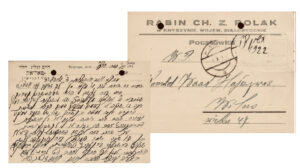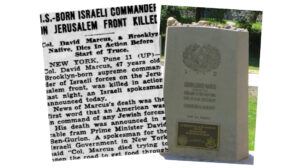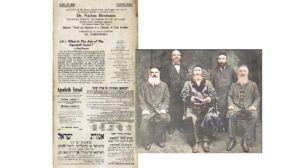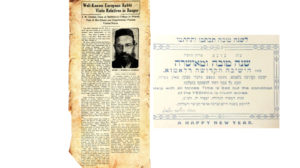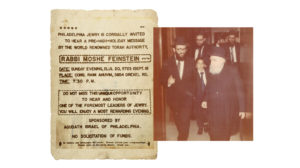Avremel’s Way

Avremel Zelmanowitz was a quiet, mild-mannered man, attracting little attention. Until he found himself alone with a colleague in a burning building, and his loyalty and consummate kindness created an explosion of kiddush Hashem that ricocheted many times around the globe.
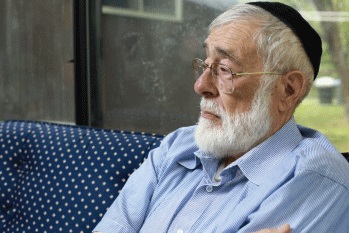
T
he Zelmanowitzes are patriots from way back. Their summer cottage near Scranton boasts a large American flag hanging off the front porch, and you can’t miss their home in Flatbush — it’s the one with a flag outside the door. There’s also a flag attached to the rearview mirror of the car parked in the driveway, and taped to the windows of both the house and the car are a grainy, computer-printed photograph of a middle-aged man with the legend: REMEMBER ME.
It’s ten years after 9/11, but the crater at Ground Zero has proven eminently more easy to fill than the hole that was left in Yankel and Chavie Zelmanowitz’s hearts when Avremel Zelmanowitz, Yankel’s brother, perished in the inferno. A computer programmer with Empire Blue Cross/Blue Shield who worked on the 27th floor of the North Tower, Avremel was a quiet, mild-mannered man who was content in his role as beloved brother and uncle, and never would have dreamed of seeking public recognition.
While Avremel attracted little notice as a programmer or community figure, his life and death illustrate the paradox behind the Jewish concept of tzniyus: that the most shining inner qualities of an ehrliche Yid are precisely those that remain discreetly hidden away in the private realm. In Avremel’s case, the depth of his fundamental goodness was not recognized beyond his immediate circles until he found himself alone with a colleague in a burning building. And then, as the building imploded, his loyalty and consummate kindness created an explosion of kiddush Hashem so powerful it fell out of the lips of presidents and ricocheted many times around the globe.
Ordinary People
Behind the flag-festooned entrance of Yankel and Chavie Zelmanowitz’s home is the kind of modest, cozy home you might expect from a Flatbush zeidy and bubby, with comfortable furniture, overflowing bookshelves, buffets crowded with knickknacks. It’s the kind of space that recalls a favorite, gently worn shoe: maybe not the most expensive or stylish, but beloved for its easy comfort.
A large portrait of Avremel hangs in the dining room, near a cabinet topped by numerous photos of him and plaques recalling his sacrifice. The stairwell walls are similarly wallpapered with signed and framed commendations the Zelmanowitzes received after 9/11 — not just from local organizations, but from highly placed politicians such as Mayor Giuliani, Governor Pataki, and President Bush (all of whom the Zelmanowitzes met at various post-9/11 gatherings).
Avremel moved into the basement of this house in 1973, when his parents, both Israeli-born, returned to Eretz Yisrael to live out the remainder of their days. While some families might have considered a live-in brother an infringement on their private lives, Yankel and Chavie shrug it off; giving their brother a space in their home was, for them, just the natural thing to do. “We all grew up together,” says Chavie, who has the kind, motherly presence of the devoted Jewish bubby she is. “Our families both davened in the Boyaner shtiebel in Williamsburg, and Avremel was my brother’s friend from way back — I remember them playing cap guns together. We all used to go to Babitsky’s Farm together in the summer, back in the days when there was no pool. The highlight back then was to go on hayrides, milk the cows, or pick cucumbers for pickling.”
Her husband, Yankel, sitting thoughtfully as we talk, has the narrow eyes and high cheekbones that bespeak the Hungarian roots of his grandparents. When he and Chavie were married, the Boyaner Rebbe recited all of the sheva brachos at their wedding, and Rav Hutner performed the kiddushin (Yankel learned in Yeshivas Chaim Berlin in the days when Rav Avigdor Miller was the mashgiach; after his marriage, he taught for a year, then worked in the textile business). Yankel and Chavie would go on to have four children, and later grandchildren and even great-grandchildren, but for some reason Avremel, thirteen years younger than Yankel, never found his bashert. “I never understood it,” Yankel says, still troubled. “He dated some, but he just never found the right one.”
Instead, Avremel became the beloved uncle and great-uncle par excellence, not only to his family but for all the neighborhood kids as well, all of whom called him Uncle Avremel. He was a spinner of stories for children, serials that would stretch on for weeks; never a fan of gefilte fish, he became known for his special “Uncle Avremel’s Relish” that he invented to slather on top to hide the taste (he was also famous for his finely cut Israeli salads, which he would prepare Motzaei Shabbos for Melaveh Malkah). He was a regular attendee of local shiurim, and would read Tehillim every morning in the kitchen before going to shul.
A talented amateur carpenter, Avremel was Chavie’s fix-it man around the house, building her extra kitchen cabinets and constructing the family succah out of wood, from scratch. “I remember how one of the neighbor’s kids used to come over when he was building the succah,” Chavie recalls wistfully. “The boy asked him zillions of questions, and he answered all of them with such unfailing patience, never talking down to him.” Of course, Avremel showed her equal patience when she took a job in 1994 in the office of Bais Yaakov D’Rav Meir: “I didn’t know my way around a computer, or even a phone system,” she says. “But I could ask Avremel all my dumb questions, and not feel embarrassed. He taught me until I felt comfortable with it.
“He had a way of anticipating other people’s needs,” she continues. For example, when Chavie’s mother, entering her nineties and unable to live alone, moved into their small home, Avremel made a point of making regular trips to the bookstore to keep her well stocked with reading material. The two developed a great appreciation for each other. (Chavie’s mother, widowed a second time, had been married to Rabbi Yeshaya Miller, the brother of Rabbi Avigdor Miller.)
Yankel and Chavie didn’t know much about Avremel’s diverse circle of friends at his job at Empire, but they knew about his fellow programmer Ed Beyea. On the superficial level, they seemed an unlikely match; Avremel, thirteen years older, was an Orthodox Jew, quiet and slight; Ed was Christian, a quadriplegic who had lost the use of his limbs in a diving accident in his twenties. Ed weighed close to 300 pounds and was known for his boisterous sense of humor. But the two shared tastes in books and music — Avremel, it’s been said, appreciated everything from the Beatles to Bocelli — and enjoyed playing computer golf and chess (Ed manipulated computer keys via a mouth stick).
Avremel’s big heart had ample room for this huge but helpless man, visiting him during his many hospitalizations, using his carpentry skills to fashion him a cigar stand so he could enjoy his beloved cigars, and a book stand that made it easier for him to read. After some research, Avremel was able to come up with a restaurant in the neighborhood that both could enjoy: it was both kosher and wheelchair-accessible. The two of them often went out to eat, accompanied by Ed’s full-time aide, Irma Fuller. “Not everyone is comfortable with a disabled person,” Chavie points out. “But Avremel was. There was once a time he was on a bus, and an emotionally disturbed person began making a scene. Avremel was able to speak to him, calm him down, and even got off the bus with him.”
Friends to the End
September 11, 2001 began about as perfect a day as one could wish for: the first nip of fall in the air, the sky a deep, cloudless blue. The Zelmanowitz brothers, who usually attended different minyanim in the morning, davened together at Selichos services. “Usually when the tefillah was over, we would shake hands, exchange a pat on the back, and wish each other a good day,” Yankel says. “On the morning of September 11, though, for some reason — I still don’t know why — we didn’t just shake hands. We gave each other a long, warm hug.” At the memory, he shakes his head and closes his eyes, overcome with emotion.
Avremel went off to work that morning, and Yankel drove Chavie to her secretarial job. On the way home, he heard on the radio that a plane had plowed into the North Tower. “When I came home I turned on the TV,” he recalls, “but only one station was working. I tried to call Avremel, but I couldn’t get through.”
“We both tried,” Chavie says. Finally Yankel called her at work; he’d finally heard from Avremel, who said he was okay and was getting ready to leave. “We were so relieved,” she says. “Then I got a call from Avremel, at work. I told him, ‘I thought you left!’$$separate quotes$$”
Avremel answered, “I’m with Ed. We’re waiting for the rescue workers.” Chavie screamed into the phone, “But you have to leave!”
“Ed wants to wait,” Avremel replied. Ed couldn’t be moved easily; with his girth, a bad move could — as happened in the past — result in broken bones. Avremel told Chavie he’d sent Irma home, because she’d returned from the cafeteria on the 43rd floor coughing from the smoke. (Irma would later tell reporters that Avremel told her, “You have children, you should go; I’ll stay with Ed.”)
FDNY Captain Billy Burke was on the 27th floor when he saw through a window that the South Tower had collapsed. He ordered his men to evacuate, telling them he was staying to help a man in a wheelchair and his friend. All of the men in his company survived; Burke was not so lucky.
Chavie recounts: “While I was on the phone with Avremel, urging him to convince Ed to leave as soon as possible, I heard Avremel talking to someone. He said, ‘A fireman wants us to move to another area.’ So we ended the phone call.” She falls silent, then shrugs. “The rest we know.”
Avremel, Ed, and Captain Burke may have made it as far down as the 21st floor, but it was too little, too late; they went down with the building. Of the 1, 914 employees of Empire occupying the 27th to the 32nd floors of the tower, all but nine and a few consultants escaped the conflagration. Strangely enough, it was later discovered that the three men fated to perish together — Avremel, Ed, and Burke — shared many things in common. All were middle-aged bachelors, devoted uncles to nieces and nephews, sociable types and good souls who always sought to be of service to others.
The days following the towers’ collapse left the Zelmanowitz family in a frantic state of limbo. They made up flyers with Avremel’s picture, which they distributed all around in the wild hope that, by some chance, somebody had miraculously spotted him. “It was a blur. We didn’t sleep,” Chavie remembers. Their son and sons-in-law went to Ground Zero and stayed on site all day Wednesday, Thursday, and Friday, but by then it seemed pretty clear there was no hope of finding him.
Tuesday was 9/11; that Friday, President Bush addressed the nation from the National Cathedral in Washington. In his speech he praised the sacrifices of ordinary Americans, mentioning that “one man who could have saved himself stayed until the end at the side of his quadriplegic friend.” The Zelmanowitzes were later told by a friend of Ari Fleischer, the president’s press secretary, that Avremel had been mentioned by name in the original version of the speech.
By Tzom Gedalyah, a week later, Rabbi Chaim Halberstam gave the family a psak that Yankel should start sitting shivah. Needless to say, the shivah house was packed with people offering their condolences. Rav Shmuel Berenbaum ztz”l came over after paying a call to the Biegeleisen family, who live not far away. “He wanted to know every last detail,” Yankel recalls. “He told us that we had an obligation to spread this kiddush Hashem as much as we could.”
And spread it they did. “Back when I was in school, public speaking and writing were my worst nightmares,” Chavie confesses. “But here I was, talking to the press and writing letters to the editor. We still continue to speak about what happened, what Avremel did. And whenever we do, we always make a point of telling everyone, ‘Avremel was an Orthodox Jew, and Ed was his Christian friend.’$$separate quotes$$”
Yankel and Chavie didn’t have to seek out publicity; newspapers, television stations and radio shows pursued them hungrily. E-mails came in from all over the world, as far as Europe, Asia, Australia. New York Times reporters Jim Dwyer and Kevin Flynn wrote a chapter about Avremel and Ed in their book 102 Minutes: the Untold Story of the Fight to Survive Inside the Twin Towers. Everybody, it seemed, was touched and united by the tale of the modest programmer who gave up his life to help a helpless friend.
“Being constantly asked to speak about it helped keep us going,” Chavie says. “That, and the fact that my elderly mother was living with us — we tried to keep ourselves together for her sake. But in the end, we found out she’d been doing the same thing for us — she also adored Avremel.”
More Than Coincidence?
“A very strange thing happened right before 9/11,” Yankel Zelmanowitz recounts. “The Shabbos before, Avremel went to a shiur that was given by Rav Meshulam Halberstam as a zchus for a sick member of the shul. The choleh had connections to Lubavitch, so the shiur was based on Tanya.
“Rabbi Halberstam began speaking about kiddush Hashem, talking about Rabi Akiva and other tzaddikim who made a kiddush Hashem. But Avremel, who was usually very quiet, not the type to ask questions, suddenly spoke out: ‘How can ordinary people, people who aren’t big tzaddikim like Rabi Akiva, make a kiddush Hashem? In the end, of course, his answer came a few short days later.
It took until August of 2002 for any of Avremel’s remains to be identified. Following identification, the family made the levayah in Eretz Yisrael. Avremel had attempted to purchase a plot for himself on Har HaZeisim a few years before, but had been unsuccessful. Yet when the family arrived on Har HaZeisim, they were astounded to find Avremel’s kever immediately adjacent to his parents’ graves. The person who had arranged their father’s levayah in March of 2000 knew that there was a plot available, and took care of the purchase.
Chavie did most of the work of cleaning out Avremel’s possessions after the shivah. “I hated doing it; I felt like I was violating his privacy,” she says with a shudder. The last four checks he wrote, on September 10, were not surprisingly made out to tzedakah — Avremel gave away a large portion of the money he earned. Chavie also found some files of his in the old computer he’d given her after buying himself a new one. One of them, which he actually downloaded a year before the attack, was a poem entitled “If I Knew.” The little-known poem, which somehow became the memorial theme of 9/11 on thousands of posts, was actually written by Norma Cornett Marek in 1989 and titled “Tomorrow Never Comes” as a tribute to her child who died, with the hope that it would inspire us never to be careless or too busy to let our loved-ones know we love them.
Some of it goes like this:
If I knew it would be the last time
that I see you walk out the door,
I would give you a hug and kiss
and call you back for one more…
If I knew it would be the last time
I would be there to share your day,
Well I’m sure you’ll have so many more,
so I can let just this one slip away…
For surely there’s always tomorrow
to make up for an oversight,
and we always get a second chance
to make everything just right...
Tomorrow is not promised to anyone,
young or old alike,
And today may be the last chance
you get to hold your loved one tight…
So if you're waiting for tomorrow,
why not do it today?
For if tomorrow never comes,
you’ll surely regret the day,
That you didn’t take that extra time
for a smile, a hug, or a kiss
and you were too busy to grant someone,
what turned out to be their one last wish...
Take time to say, “I’m sorry,”
“Please forgive me,” “Thank you,” or “It’s okay.”
And if tomorrow never comes,
you'll have no regrets about today.
Preserving the Memory
Avremel’s story touched many people; the Zelmanowitz family as well as Empire Blue Cross/Blue Shield set up scholarship funds in his memory; the third grade talmidim of Yeshivas Chofetz Chaim instituted a “Project Amein!” campaign l’iluy nishmaso; and the Yeshiva Gedolah Ohr Yisrael of Marine Park dedicated a library in his name. Since Avremel’s passing, two Zelmanowitz grandchildren, Avraham Yosef Stern and Avraham Yosef Menachem Zelmanowitz, and one great-grandchild, Shlomo Yosef Zelmanowitz, have been named after their great-uncle.
The stretch of East 35th Street where the Zelmanowitz family lives ultimately memorialized Avremel by undergoing a name change to “Abe (Avremel) Zelmanowitz Way.” This was a project that required Yankel to navigate reams of red tape, getting approval from countless city and civic organizations (then-City Councilman Lew Fidler was especially helpful). The new name was officially bestowed in a public ceremony in 2006.
“It was Chol HaMoed Succos, and we had a beautiful day for it,” Yankel says. “The funny thing is, we chose the word ‘way’ for the sign, instead of ‘lane’ or ‘road’ without really thinking about it too much. But at the ceremony, Rabbi Shloime Zucker spoke and pointed out how appropriate our choice was: Avremel showed us the ‘way,’ the way a person should behave bein adam l’chaveiro [to his fellow] and bein adam l’Makom [to G-d].
“You know,” he adds thoughtfully, “I once heard Telshe rosh yeshivah Rav Bloch say that bein adam l’chaveiro is really, in the end, the same as bein adam l’Makom. The two principles aren’t separate from each other.”
A small measure of closure came for the Zelmanowitzes on Sunday, May 1 of this year, when the announcement came that Osama bin Laden had been killed by US forces. “We were happy to know that he’d been held accountable for his deeds,” Chavie nods. The event sparked a desire to revisit Ground Zero, and the next day found them headed for the subway.
“We got on the train, and our cell phone rang,” Chavie says. “I was surprised, because we’re really not cell phone people. But it was our son, saying that NBC wanted to interview us. We told him to call them back and tell them we were on our way to Ground Zero.
“We got there to find the place bursting with media trucks, cars, satellites from all over the world. We got bombarded — we ended up talking for hours! We later saw that Avremel’s picture and story were told on the NBC Nightly News by Brian Williams. After hours of this we finally broke away and found a kosher pizza place to sit down —we were totally wiped out.”
This year, on the tenth anniversary of 9/11, they’ve been invited, as part of that strange, sad fellowship of families of 9/11 victims, to another kind of ceremony. “There won’t be long speeches by the politicians,” Chavie says. “Maybe a few words and a poem.” President Obama is expected to be there, as well as former President Bush, Governor Cuomo and Mayor Giuliani. Chavie says the group will go down to the plaza where the memorials are, near the pools and waterfall, and spend time next to the bronze plaque upon which the names of the victims are inscribed.
But all the ceremonies in the world won’t bring back their brother, and the tears still flow. “We miss him,” Chavie says simply.
There’s a famous gemara (Kesubos 77b) that speaks to the often unrecognized stature of “little” people. The Gemara recounts that the son of Rabi Yehoshua ben Levi became ill, and fell into a deep coma. When he awoke, he recounted his vision of the Next World: “It’s not like here; it’s upside down,” he said. “The big people are small, and the small people are big.”
Avremel Zelmanowitz wasn’t rich or famous during his lifetime; he didn’t even have generations to boast of or to carry on his name. But this quintessential “little guy” is now over there on the Other Side. And from that vantage point, the once-obscure programmer has surely grown into a giant.
(Originally featured in Mishpacha Issue 375)
Oops! We could not locate your form.

